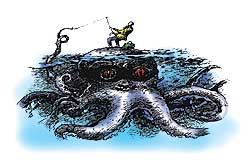 One month after the declaration of the state of emergency and an information blackout on the military's campaign against the Maoists, questions arise about an exit strategy.
One month after the declaration of the state of emergency and an information blackout on the military's campaign against the Maoists, questions arise about an exit strategy. Constitutionally, the government needs to muster a two-thirds majority in parliament by midnight 25 February to extend the emergency by another three months, and after that parliament can decide to extend it for yet another six months. But till then, what? When are we going to know that we don't need the emergency anymore?
"Our constitution deliberately limits the duration of a state of emergency," Narahari Acharya of the Nepali Congress. Acharya said Tuesday at a panel discussion organised by Himal Khabarpatrika. Acharya maintained that the country was still under civilian rule. "An emergency does not mean martial law," he added, "the constitution does not allow that."
Speaking at the same panel, Krishna Khanal, professor of political science at Tribhuvan University, saw no visible presence today of civil authority. "We don't know how free we are to speak out about what we see, and we also don't see an exit from the emergency," he said. "There is danger of the government finding it more comfortable to work under an emergency, and larger parties also seeing their short-term interests secured by backing it."
There is confusion about the do's and don'ts of emergency regulations. The bottom line: who is calling the shots? Prime Minister Sher Bahadur Deuba has repeatedly assured the public that the government will use emergency powers only against the Maoists, but the emergency automatically suspends civil rights including press freedoms. The Royal Nepal Army has requested media to get reports, commentary and pictures on the war "fact-checked" before publication, while the government says there are no restrictions whatsoever. This week two journalists were picked up from their homes at night on unspecified charges, and released more than 12 hours later.
There are also reports of arrests in the districts, but the government hasn't divulged who have been taken in and where they are being held. The human rights organisation INSEC estimates as many as 1,300 people may be in custody. "We've not been able to verify the incident reports, or question eyewitnesses," Subodh Pyakurel of INSEC told us. "We don't have access."
Official tallies show more than 80 Maoists and security personnel killed after the emergency was declared on 26 November. This does not include the estimated 250 killed between 23-26 November in Dang and Salleri. So far, 24 Royal Nepal Army soldiers have been killed in action and another 58 wounded since the Maoist attacks in Dang. There is no independent verification of these casualties, or the numbers of wounded, from human rights groups or the International Committee of the Red Cross (ICRC) which have no access to the front.
The independent Human Rights Commission tried to do some fact-finding on Monday by inviting the Home and Defence Secretary for a Q&A. The Commission was concerned about emergency medical equipment, hospitals in conflict zones which have rarely had doctors in the past, and the security and whereabouts of those arrested. "We were unable to get a satisfactory answer," a Commission member told us.
Shanker Pokhrel of the UML's Rapti Zonal Committee, who is just back from Dang, is concerned about the reliability of official reports of deaths on the fontline. He asks: "How is such information going to affect the credibility of the state and democracy?"
Some critics say the media's credibility has already been compromised, and actions like the detention of the two editors this week will intimidate others. "This ultimately calls into question the credibility of the civil government," researcher Pratyoush Onta told the panel on Tuesday. Media commentator, CK Lal, was more worried about self-censorship in media and how this would undermine democracy.
The UML's Shanker Pokhrel is convinced it would be in the government's interest to let civil society function more independently. He told the forum on Tuesday: "I know of locals that have been killed in the offensives, some were even Congress supporters. In the villages people are frightened of being shot from the sky."
The other civil society concern is about the economic cost of the war, and the lack of transparency in procurements. "It is a national tragedy we're being forced to divert funds from development to armaments," said professor of political science Dhruba Kumar. He asked: "Can we afford this? How long can we fight the Maoists using the army?" Kumar was also concerned about the tendency for "rightist forces" wanting a greater say in government decisions in times of conflict. The military was planning major weapons upgrades even before the fighting began, and there is an added sense of urgency about it now.
The Nepali Congress' Narahari Acharya is sanguine that after the emergency is over, there will be an opportunity to take excesses to court. Trouble is, no one knows when that will be. However, there is one constitutional clause saying the king can cancel the emergency order at anytime while it is in effect.


